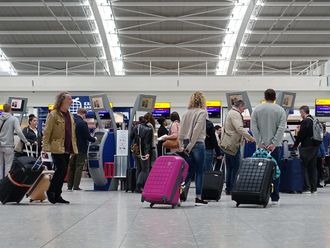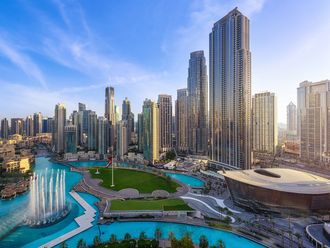
Dubai: Saudi Arabia announced a 990 billion riyal ($263.91 billion) budget for 2021 on Tuesday, around 7% less than estimated for this year, as the world's biggest oil exporter seeks to tame a huge deficit caused by lower petroleum revenues and extra spending on the coronavirus crisis.
The kingdom expects to post a deficit of 298 billion riyals this year, or 12% of gross domestic product (GDP), and 141 billion riyals or 4.9 per cent of GDP next year, according to a budget statement.
Growth with stability
The finance ministry said the budget reflected "the ability to adopt appropriate policies to balance between growth, economic stability and fiscal sustainability in the medium and long term." Saudi Arabia expects the economy to shrink by 3.7 per cent this year but to swing back to a 3.2% growth next year.
Saudi Finance Minister Mohammed al-Jadaan said in a press conference that most economic sectors had started to recover from the pandemic's impact in the second half of this year.
Brent crude oil prices have rebounded since plunging to a more than 20-year low in April, but at around $50 per barrel they are significantly below the $67.9 per barrel that Saudi Arabia would need to balance its budget next year, according to the International Monetary Fund.
Debt surge
Saudi Arabia expects public debt to increase to 937 billion riyals next year from 854 billion riyals this year.
Government reserves at the Saudi central bank are expected to drop to 280 billion riyals next year from an estimated 346 billion this year, the finance ministry said.
Saudi Arabia tripled a value-added tax in July to 15 per cent to boost state coffers and offset the drop in oil revenues.
This year revenues are estimated at 770 billion riyals and 849 billion riyals next year, the budget statement said.
For 2020, Saudi Arabia estimated oil revenues at 412 billion riyals after budgeting 513 billion riyals and estimated non-oil revenues at 358 billion riyals after budgeting 320 billion riyals.
Tough deficit target
Monica Malik, chief economist at Abu Dhabi Commercial Bank, said the deficit target for next year looked ambitious, "but this year we have seen vital support to the budget through strong Aramco dividend and investment returns, and these are likely to be key factors in 2021." Saudi Arabia does not disclose the oil price assumption on which it bases its budget, but Rory Fyfe, managing director at MENA Advisors, said it was likely based on a Saudi export price of about $48 per barrel.
"This is roughly in line with market expectations," he said.
Mazen al-Sudairi, head of research at Al Rajhi Capital, said it was difficult to forecast oil revenues for the government "because it includes the additional variable of what dividends Aramco will pay to the government." Saudi oil giant Aramco has said it would pay an overall dividend of $75 billion this year, the large majority of which would go to the government.








